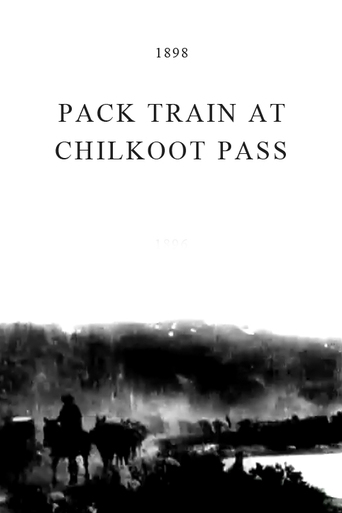

This film of gold prospectors crossing the dangerous Chilkoot Pass was filmed by Robert Bonine, and an Edison licensee Thomas Crahan. Not much really happens here; the title tells it all. We see a train of pack mules with heavy loads on the Pass, coming from the right side of the screen and passing to the left. If only the print was cleaner and more refined; this would've made the sight much better. Occasionally we see some shapes of men on horses, and a figure standing on the left side of the screen, watching the train, is visible. Apart from the historical interest of the prospectors using the Pass to get to the gold in the the Yukon, nobody besides silent film enthusiasts is really going to appreciate this scratched minute of film from over a hundred and twenty years ago. It's still an interesting look into our past, however.
... View MoreThat's really all there is to it. The only thing interesting related to this short film I can think of is a comparison with the exact same location today and what has changed, what has stayed the same etc We see a horse entering the picture, a white one to indicate the leader. It followed by quite a few more horses (or donkeys? not sure). And they keep coming and keep coming and keep coming... Every here and then, a rider sits atop of a horse, often another white one and they keep pursuing their route. It's really a lot of animals though. I was sort of impressed by the sheer quantity. Not that amazed by the heavy baggage they had to carry though. Poor donkeys. All in all, 70 very unmemorable seconds. Not recommended.
... View MoreThis short but interesting footage uses good composition to communicate the feel of watching a mule train traveling along Chilkoot Pass, which was frequently used by gold miners in the 1890s. The pass connects Alaska with the Yukon Territory, and it is the location for some ruggedly beautiful scenery.The fixed camera field is set up so as to catch a lengthy portion of the pack train as it moves around a bend and then comes towards the camera. The footage makes the considerable length of the train quite clear to the viewer, and the effect of the mules moving towards the camera also works well.The scratchy, faded condition of the surviving print is unfortunate, because in its original form this might have been quite attractive to look at. You can still see just enough detail to get an idea of what the setting really looked like. There is also a curious stretch towards the middle, when a lone figure walks into the picture from a vantage point a bit above the level of the train. It would have been interesting to know what he was up to, and whether his presence was intended. But in any case, it's a pretty good little feature.
... View More